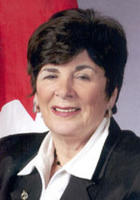These People Get to Play The Supreme Court Shell Game
Justice Minister Irwin Cotler has officially named the members for his advisory committe to select a new justice for the Supreme Court. (I'd link to the release, but apparently Justice Canada's website is undergoing some renovations today.)
We have four Members of Parliament, of course.



 In order, from left to right: Anita Neville (Winnipeg South Centre, Liberal), Parliamentary Secretary for Canadian Heritage; Vic Toews (Provencher, CPC), the Tory Justice Critic; Richard Marceau (Charlesbourg-Haute-Saint-Charles, BQ), Justice Critic for the Bloc; and Joe Comartin (Windsor-Tecumseh, NDP), Justice Critic for the N-Dippers.
In order, from left to right: Anita Neville (Winnipeg South Centre, Liberal), Parliamentary Secretary for Canadian Heritage; Vic Toews (Provencher, CPC), the Tory Justice Critic; Richard Marceau (Charlesbourg-Haute-Saint-Charles, BQ), Justice Critic for the Bloc; and Joe Comartin (Windsor-Tecumseh, NDP), Justice Critic for the N-Dippers.All four are members of the House Standing Committee on Justice. Of course, Mr. Toews is still grumbling about the process:
He denounced the move as a "public relations exercise" and contended it made a mockery of Prime Minister Paul Martin's promises to reform the way judges are selected for the top court.
In addition to those four, we have the following:

Allan McEachern is the nominee from the Canadian Judicial Council, the disciplinary body for all federal judges. Currently a partner in the law firm of Fasken Martineau, he was the Chief Justice of the B.C. Court of Appeal until retiring in 2001.
 W. Brent Cotter was selected for membership by the Attorneys General for Alberta, Saskatchewan and Manitoba. He's the Dean of the University of Saskatchewan's Faculty of Law, and a former civil servant in the Saskatchewan government.
W. Brent Cotter was selected for membership by the Attorneys General for Alberta, Saskatchewan and Manitoba. He's the Dean of the University of Saskatchewan's Faculty of Law, and a former civil servant in the Saskatchewan government. Garth Smorang is the president of the Law Society of Manitoba. and was selected for membership by the law societies of the three prairie provinces. (The fact that Cotler himself was a former member of the LSM shouldn't be held against him.)
Garth Smorang is the president of the Law Society of Manitoba. and was selected for membership by the law societies of the three prairie provinces. (The fact that Cotler himself was a former member of the LSM shouldn't be held against him.)The committee membership also called for two members who are neither lawyers not judges. And here they are:
 Chester Cunningham's main claim to fame is that he founded the Native Counselling Services of Alberta, which provides social services for the province's Aboriginal community. While he has an LL.D, he's not a practising lawyer.
Chester Cunningham's main claim to fame is that he founded the Native Counselling Services of Alberta, which provides social services for the province's Aboriginal community. While he has an LL.D, he's not a practising lawyer. Barbara Pollock is an academic and public relations expert. A former president of the Canadian Public Relations Society, she's currently the vice-president (external relations) of the University of Saskatchewan.
Barbara Pollock is an academic and public relations expert. A former president of the Canadian Public Relations Society, she's currently the vice-president (external relations) of the University of Saskatchewan.Looking at the membership, it's obvious that Cotler tried to get as representative a group as he could, for the unwritten qualifications that critics outside government might harp on. Mmes. Neville and Pollock would represent women, Cunningham would speak for the natives, McEachern covers B.C., and Marceau equals Quebec. About the only thing lacking is representation from the North, but that's not absolutely crucial because the vacancy in question is for Western Canadian representation on the Court (John Major's impending retirement).
The committee will take a look at a list of 5 to 8 candidates, made up from a candidate pool set up by Cotler with public input. They will then whittle the list down to three contenders.
Although I can't argue about the qualifications of each member, I can argue about the process, because it's going to be in camera. The Justice department originally recommended this because it wants to protect the privacy of the candidates on the list. But I don't see how making the process public is going to wreck a candidate's career. (It didn't exactly harm Clarence Thomas' prospects down in the States.)
For a position this important, public transparency about selection is a must. The qualifications of the members are only a little re-assuring, but the decision is still the PM's and Cotler's, who could theoretically reject the committee's recommendations in favour of their own.
Toews has been arguing that the actual decision should be up to the people, and therefore up to Parliament. It doesn't mean he won't do his job and work on this committee, but Toews is a useful reminder that no matter how this is dressed up, Supreme Court selection is still a shell game.





<< Home